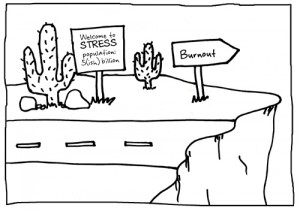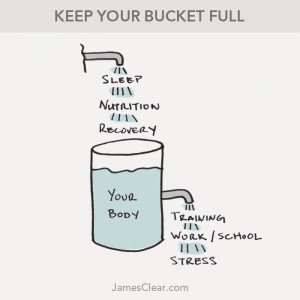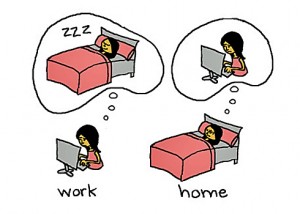Sunday, January 22nd, 2017...5:30 pm
Real Talk on Grad Burnout
We’ve done a few workshops in the past about avoiding burnout as a graduate student, but the importance of just how real of a possibility this is for students didn’t hit home until yesterday. Recently, I was asked to take on a new job that would could make securing a more permanent position post-graduation (in a few short months) a real possibility; of course, I said yes and accepted the job.
That means, though, that in addition to finishing my Masters and being a VP on my faculty’s student association, I also now have three part-time jobs. And I’ve also decided that I want to get my health back on track so I’ve committed to going to yoga. Suddenly, my life feels very much like a recipe for disaster. In an attempt to gain some much-needed focus and breathing room, I have turned to good old google for help.
A quick search revealed this list:
- Work with purpose.
- Perform a job analysis, and eliminate or delegate unnecessary work.
- Give to others.
- Take control, and actively manage your time.
- Get more exercise.
- Learn how to manage stress.
I can get on board with most of this: getting more exercise releases endorphins and can help us feel good in the long run (not to mention it makes us healthier in order to manage everything else going on), giving to other also makes us feel good because we feel like we’re contributing to others well-being and that’s an emotional boost we could all use, and actively managing my time and working with purpose deserves a huge asterisk as well – not getting sucked into a Netflix binge while telling myself “I’ll just have it on in the background while I work” is certainly a habit that needs to be broken.
It’s numbers 2 and 6 that I am struggling with, and which I think are the main things that are going to turn my juggling act into a crumbling act. Given that we’re all graduate students, I’m sure we all share that competitive streak and were, to an extent, that student who maybe took on too much of the group project while we were growing up. As an adult, this isn’t always a good trait. In my new job, I’m being given the chance to lead a group of people, and part of nurturing a good team dynamic is being a leader who recognizes the strengths of their team and delegates accordingly; in other words, we ask for help. So, to myself and to you, don’t be wary of asking for help when you need it. We’re in a rich community of intelligent, hard-working, go-getter people who can definitely be counted on to support us and help us, just as we would help them in turn. Take stock of what you need to do, and then maybe take a deep breath and think about the things that would still be well-accomplished if you weren’t the person doing them…and then delegate. It could be something as simple as making an appointment with the Academic Success Centre to have a second pair of eyes edit your writing; those bodies are here to support our learning as students, so you shouldn’t shoulder the responsibility alone.
What strikes me as the most important thing on this list though, is google’s advice to “learn how to manage stress.” That is easier said than done, google, easier said than done. If we’re asking for help, though, and we’re taking care of our health and working with purpose so that our time is better managed, then I think some of that stress might take care of itself. For that leftover stress and feelings of anxiety though, what do we do? The best advice I’ve found is simple: find something that distracts you, and let it calm you. Carry a small colouring book and pencil crayons, take 10 minutes each morning to practice mindfulness, talk to people over coffee who can relate to what you’re going through so you don’t feel alone, run a little longer, have a solo dance party, take up knitting on your commute. The point is to have an outlet that’s not rooted in the source of your stress to help center your thoughts, bring you back on track, and reduce the feeling of anxiety. A lot of anxiety and stress comes from the fear that there are factors in our life we can’t control, and succeeding at something that we love and is not being graded or evaluated is a great way to help you feel more competent in other areas of your life. For me, it’s writing, which is why this post is so much longer than others! Whatever you do, make sure you’re taking care of your health first, and that you know what supports are around you to help you avoid the burnout.
Resources on Campus:
Writing Support – http://bit.ly/2jMWNpU
Grad Wellness – https://www.sgs.utoronto.ca/gradlife/Pages/Grad-Wellness.aspx
CRC – http://gradcrc.utoronto.ca
Grad Escapes – https://www.sgs.utoronto.ca/gradlife/Pages/Grad-Escapes.aspx





Leave a Reply